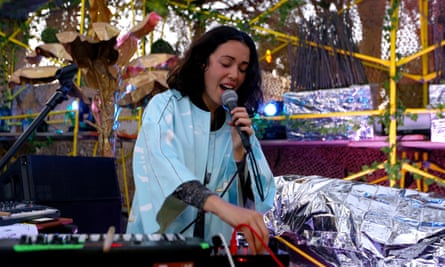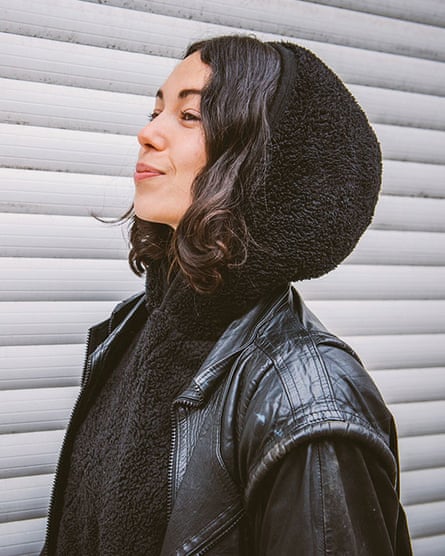Kelly Lee Owens is showing me her crumpled bed, pixelated on the screen. It is five weeks into quarantine and this has quickly become the norm: an interview with an artist in their close quarters; ambivalent levels of grooming. Neither of us is wearing makeup, and neither of us care. “You know what I read?” begins the electronic musician, incredulously. “This is bullshit. There’s a [Daily Mail] headline saying that women’s breasts will be sagging because they’re not going to be wearing bras during this lockdown. So what?! Leave me to my saggy breasts.”
And so it is over FaceTime, Owens in a black turtleneck top, two gold heart-shaped pendants dangling from her lobes, and occasionally a flash of Walthamstow, north-east London, through her window. The earrings belonged to Owens’s “nana”, to whom she was incredibly close and who passed away last year. “She was there two minutes after I was born and I was with her when she died,” she says, her tone darkening. “I was holding her, talking her through her death.
“I’ll show you, actually, I’ve got this shrine,” she says, heading over to her dresser and pointing to an assortment of candles, a playing card in the middle. “She signed it with her name, Jeanette, and that’s one of the tracks on my new album. I think it’s important to have a place to connect.”
That album is called Inner Song and its release has been pushed back from May until August. It is an obvious blow for Owens after the momentum of her self-titled debut in 2017, which made many a publication’s end-of-year list, with its deliriously buoyant techno-pop, as dreamy as it was pumping. She is trying to remain upbeat but says the decision was to stand in “solidarity” with record shops, which have had to temporarily close.
When Owens moved from Wales to London in her 20s, she worked at Pure Groove records, where she met many DJs who encouraged her to pursue music. She had always been Team Indie, with a stint in the shoegaze band the History of Apple Pie, but the sessions for her former co-worker Daniel Avery’s Drone Logic album, on which she provided her hypnagogic vocals, turned her on to techno. Watching her friend in the studio with her future engineer, Ghost Culture, she says, “it seemed like they were crafting magic”.
Owens decided to craft magic of her own, ditched her band and started performing as a one-woman Berghain with synths and guitar. But as her popularity grew, her personal life started going south and she wasn’t enjoying her breakthrough success. “A relationship that I was in was quite destructive,” she says. “Me being me, I just powered through.” But then, “there were times when I was in bed, and I couldn’t move,” she admits. “I was trying to juggle lots of things to keep different people happy, and neglecting myself.” It’s a familiar story for women, putting others’ happiness ahead of our own. “We’re actually taught to do that, I think,” Owen agrees.
After that, she went through a period of having to, as one song title goes, “re-wild” herself. She read Clarissa Pinkola Estés’s Women Who Run With the Wolves, spent time in nature, did free writing and undertook a “body release trauma session”, which involved the rather intense experience of having someone stare into your eyes for five minutes. The week after that, she says, “I wrote most of the lyrics for the album – I could be honest with myself and I could feel the losses, all the things I’d been holding in.”

Owens understands the role of healing more than most: in her late teens, while others would be waiting tables, she worked as an auxiliary nurse in a cancer ward, “holding people’s hand as they die”. The job gave her a unique insight into death. “Hearing is supposedly the last thing that goes,” she says, and so, when her grandmother died, “everyone was around her, holding her hands, telling her they loved her. That’s one of the ways to die well.
“This sounds really weird,” she adds, “but I feel like later on in life I might become a death doula. We need to have more conversations about death, and I’m not afraid of that.”
It is obviously devastating to consider that, right now, people aren’t able to see their loved ones as they pass. “People are dying alone and it’s a very serious thing,” Owens nods, although she has been thinking about alternative comforts. “I know it’s a pandemic, but maybe there could be their favourite scent in the room, or maybe there could be music playing,” she suggests. “It’s obviously not easy to do any of this, and the NHS is struggling, but I can’t help but think of little ways that would help ease [their pain].”
She recently dedicated a playlist of calming tracks to care workers, some of whom she is still in touch with from her hospital days, and who she is understandably concerned about. “The PPE [shortage] is absolutely huge,” says Owens. “I know a lot of doctors who are refusing to work, and I fully support them in that. The government is putting it as a war, so we have ‘heroes’, and actually all they’re doing is what they’d normally do with wars, which is to sacrifice people.”

Death crops up a little on Inner Song, including the destruction of the planet on the climate-crisis banger Melt!. But the album is also concerned with finding your way back to yourself. In a way, the making of it has been preparation for a scenario like the current moment: many of her lyrics suggest finding strength in solitude, atop kosmische soundscapes and 2-step beats. Owens’s voice is front and centre this time, instead of acting as another instrument, and we hear a lone male voice, too, on “psychedelic lullaby” Corner of My Sky: that of John Cale, whom she had asked to read a poem. It’s still rare to hear a lone male vocal on a piece of electronic music produced by a woman. “That’s quite bizarre, isn’t it,” ponders Owens, “but I think you’re right.”
It was her “insistence”, she laughs, that resulted in her and friend Jon Hopkins making the ambient-trance song Luminous Spaces in January. Originally a remix of his track Luminous Beings, Owens did the arrangement and added vocals, and it became something new entirely, even otherworldly. So it was disappointing for Owens to see the part she played diminished.
“Unfortunately, all the comments on YouTube are like: ‘Jon’s a wizard, he’s amazing,’” she says. “His production is amazing, but I took that track and made it what it is. And he’ll tell you that.
“It’s boring,” she continues, “but I still have to fight my corner, because if I don’t I’m passed off as ‘just the singer’. Why are we presuming that if a woman’s voice is on something, it’s the only thing she’s contributed? We have to keep undoing those preconceptions.”
You can hear traces of Hopkins’s style of thwacking rave on her new song, Night, but that might not be the only influence he’s had. In a previous interview, Owens told me that the late, great DJ Andrew Weatherall had come into Pure Groove once and asked her: “Kelly, do you take drugs? Because I’ve heard your track Lucid,” one of her more mind-altering productions. Has that changed? Hopkins’s last record was, after all, partly inspired by trips on DMT. She ripples with laughter. “Let’s just say with the track, Corner of My Sky, that might be what microdosing mushrooms sounds like. Maybe!”
Owens is keen to find positives everywhere she possibly can. She recently tweeted the definition of the word “apocalypse”, to mean “revelation – an unveiling or unfolding of things not previously known”. Does she think, then, that there could be tiny positives to the pandemic at all? “I do, and that’s just because I’m in a very privileged position to say it,” she says. “I’m hyper-aware of how you can come across when you say: ‘This is good for the planet.’ But it also is important to point out the duality of consciousness, and raise awareness of what can happen when we are apathetic.”
The track on her album, Wake-Up, points to this idea, too. “One of the things [it questions],” she says, “is never pausing to take it in, always avoiding your sense of dread.” A world-changing event like this “forces us to ask important questions. Globally, we are connecting now. That’s what’s important.”
Inner Song is out on Smalltown Supersound on 28 August. The track Night is out now

Comments (…)
Sign in or create your Guardian account to join the discussion